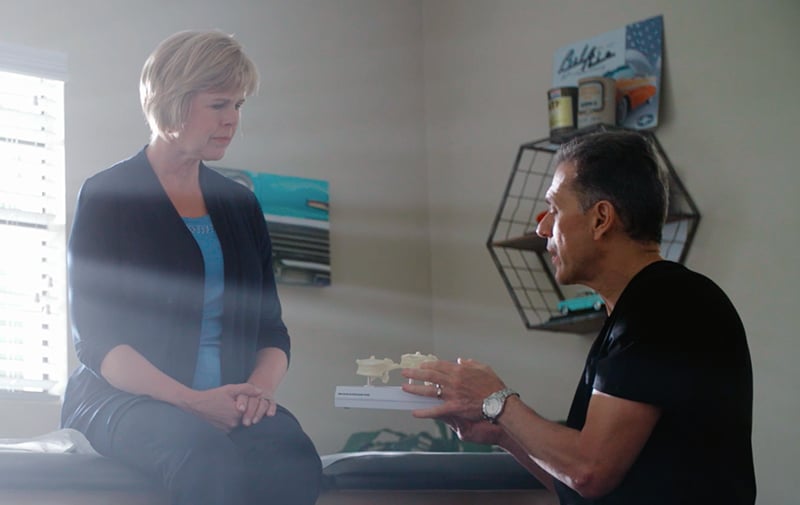Revision Spine Surgery
Spinal revision surgery, or revision spine surgery, is a procedure performed in the event of failed Back Surgery Syndrome, spinal degeneration, herniated discs, and other issues. At Citrus Spine, we specialize in revision spine surgeries and work to get you back to a better life with less pain and more range of movement. Learn more about spinal revision surgery below.

What Is Revision Spine Surgery?
As the name implies, revision spine surgery is a second procedure often performed to correct a failed spinal surgery or one that doesn’t provide the intended relief or results. Ultimately, your surgeon will seek to decompress or stabilize your spine to reduce pain and enable regular physical activity to resume as soon as possible.
While you may not be looking forward to another spinal surgery, spinal revision surgery may be necessary for you to get back to the life and activity level you prefer. Thankfully, minimally invasive techniques are available for some patients that can achieve success with quicker recovery and less pain. Depending on your specific diagnosis and needs, spinal revision surgery may be performed as an outpatient procedure utilizing these techniques.
As experts in revision spine surgery and minimally invasive spinal procedures, our team at Citrus Spine can help you achieve a successful spinal revision so you can get back to what you love most - living and moving freely, without pain.

All About Spinal Revision Surgery
If you’re wondering how to spot the potential need for revision spine surgery, what to do if you suspect you may need specialist attention, what exactly the procedure will entail, or how Citrus Spine can help revive your quality of life by alleviating aggravating pain and mobility issues, read on.
What Are the Signs You Need Spinal Revision Surgery?
For many patients, revision back surgery may be necessary because of Failed Back Surgery Syndrome (FBSS). However, this is only one case where your care team may recommend revision spine surgery. You may be referred to a spine specialist for spinal revision surgery because of adjacent pathologies (similar symptom groups), non-surgery related spinal degeneration, herniated discs, spondylolisthesis (a condition where a vertebra slips forward onto an adjacent bone), pinched nerves, or the crankshaft phenomenon (a progressive rotational and angular spinal deformity).
Hardware failure from a previous surgery, a new injury, infection, errors during surgery, flat back syndrome, pseudoarthrosis (fusion failure), and scar tissue formation are other conditions or symptoms that may lead to needed spinal revision surgery.
Here are some symptoms to look out for:
- New pain that wasn’t there pre-surgery or pain that’s worse
- Nerve pain
- Pain or numbness that radiates into your limbs
- Poor healing
- Chronic pain
- Muscle spasms or weakness
- Back or neck spasms
- Redness at the surgical site
- Stiffness that inhibits daily activities
- Incontinence
If you have any of these symptoms, consult with a spinal specialist. They can determine the right treatment plan and walk you through your options if surgery is required.
Learn More About Revision Spine Surgery
There is no cut-and-dry answer to what revision spine surgery looks like - it looks a little different for every person. The surgical methodology your doctor uses will depend on the issue of origin, the reason the original spinal surgery failed, and what courses of treatment have occurred.
In many cases, doctors recommend milder treatments and other pain mitigation techniques for a minimum of six months before resorting to another surgery. After all, even with minimally invasive techniques, surgery carries some inherent risks and is, by its very nature, often a more intensive procedure.
If you and your care team determine that revision spine surgery is the best treatment, discuss your options thoroughly. Spinal revision surgery can be performed either open or via minimally invasive techniques, depending on the case, cause, and needs to alleviate your problems. Common minimally invasive procedures used for spinal revisions include microdecompression (microdiscectomy), cervical or lumbar fusions, laminotomy, and foraminotomy.
Procedure length, recovery time, and personal restrictions leading up to and after the surgery will depend heavily on which surgical method is required, especially whether minimally invasive techniques are possible to achieve success in spinal revision surgery.
As with any surgical procedure, there are some potential risks. General surgery risks include infection, excessive bleeding, blood clots, and poor reactions to anesthesia. Risks specific to revision spine surgery include increased scar tissue formation, higher infection risk, prolonged recovery time, nerve damage, blood loss, and adjacent segment disease.
Revision spine surgery is a technically challenging procedure, the exact difficulty level depending on each patient’s unique pathology. When minimally invasive surgical approaches are possible, the risks are much lower than open spinal revisions. Your doctor should walk through each potential risk associated with surgery in general and the specific procedure and surgical methodology you will undergo.
Additionally, your surgeon and care team will share lifestyle changes that can help lower risk or pre-existing conditions that may heighten your risk. For example, cessation of tobacco use and reducing your weight if you are obese can contribute to more manageable risk levels. In contrast, specific conditions like diabetes, autoimmune disorders, and peripheral artery disease can increase your risk (as well as increase the likelihood that a revision spine surgery is needed in the first place). Discuss all risk factors and how your care team will navigate them before surgery.
The success rate of revision spine surgery can vary depending on many factors. Patient history, pre-existing conditions, comorbidities, the severity of revision needed, and relevant risk factors all play a part. However, many patients experience significant relief after recovering from spinal revision surgery, especially in comparison to the pain levels after a failed back surgery.
To give yourself the best chance for success and positive surgical outcomes, it’s vital to choose a care team and surgeon who specializes in spinal revision surgery and the spine, neck, and back. That’s why the experts at Citrus Spine are dedicated to these focus areas.

The Citrus Spine Difference
For us, the patient remains the king, in everything that we do.
01
02
03
04
What to Know Before Revision Spine Surgery
From cutting out tobacco products to following a healthy diet and exercise regimen, and more, preparation is key before your revision spine surgery.
Your healthcare provider will have recommendations and requirements for you to prepare for your procedure. Follow these guidelines and let them know of any changes in your condition or overall health in the days leading up to your surgery.
The Process of Spinal Revision Surgery
From the moment you arrive for your scheduled surgery, the team at Citrus Spine will help soothe your nerves and walk you through each step of the way as it comes. Work with your specific surgeon and care team to ensure all details are accounted for, but in general, you can expect your surgical day to include:
- Pre-Surgery Preparation: You’ll be taken to a pre-operative area where your medical history is reviewed, and an anesthesiologist will discuss your anesthesia plan.
- The Surgery: Depending on your specific needs, your surgeon will use either a minimally invasive technique involving smaller incisions and quicker recovery or an open surgery for more complex cases. Advanced imaging and monitoring ensure precision and safety throughout.
- Post-Surgery Care: After surgery, you’ll be monitored in a recovery area as you wake from anesthesia. Your surgeon will update you on the procedure’s success and outline the next steps in your recovery process before discharge or transfer to a hospital room.
Let’s take a closer look at the different surgical approaches your doctors may take.
Minimally Invasive Revision Spine Surgery
At Citrus Spine, we specialize in minimally invasive procedures, using modern techniques to minimize the impact of surgery on the patient’s body. Minimally invasive spinal revision surgery focuses on reducing recovery time and surgical risks. With minimally invasive revision back surgery, you can expect:
- Smaller Incisions: Typically involves smaller incisions, leading to reduced scarring and quicker healing.
- Reduced Muscle Damage: Less disruption to surrounding muscles and tissues, which can decrease post-operative pain and recovery time.
- Faster Recovery: Patients often experience a quicker return to normal activities compared to open surgery.
- Lower Infection Risk: The smaller incision size and less exposure of internal tissues can result in a lower risk of infection.
- Precision: Advanced imaging technologies guide the surgeon, enhancing precision during the procedure.
Open Revision Spine Surgery
Sometimes, the patient's needs require the more traditional, open surgery approach. While more invasive, open revision spine surgery offers more comprehensive access to the surgical area, making it a good choice for more complex cases that require extensive surgical intervention. With open revision spine surgery, you can expect:
- Larger Incisions: Involves more extensive incisions, which can lead to greater scarring and a longer healing process.
- Comprehensive Access: Provides the surgeon with a more comprehensive view of the spinal anatomy, which may be necessary for complex cases.
- Greater Muscle Disruption: The larger incisions and more extensive tissue manipulation can lead to more significant muscle damage and longer recovery times.
- Higher Infection Risk: The increased exposure of tissues compared to minimally invasive techniques may elevate the risk of infection.
- Used for Complex Revisions: Often preferred when previous surgeries or severe spinal issues require more extensive intervention.

Spinal Revision Surgery Recovery
What is the Recovery Process After Revision Spine Surgery?
With any spinal surgery, it’s normal to feel pain, soreness and stiffness in the affected area – this should improve as you recover in the weeks following your surgery. Your doctor may prescribe pain medications, over-the-counter medications or antibiotics.
You will also have a list of restrictions to follow closely to ensure a smooth recovery. These may include:
- Avoid certain movements. Don’t bend forward or backward or twist your body side to side.
- Follow weight restrictions. Avoid pushing, pulling or lifting items heavier than five pounds.
- Don’t stay sedentary. While you should not participate in rigorous exercise until your doctor has cleared you, you should also avoid sitting for long periods. Taking short walks regularly can help with the healing process.
Your doctor may also prescribe a back brace and physical therapy.
How Long Does Spinal Fusion Revision Recovery Take?
Recovery from revision spine surgery varies depending on the approach used and the complexity of the procedure. Generally, minimally invasive surgeries may allow patients to return to normal activities within a few weeks, while open revision surgeries often require a more extended recovery period of several months to ensure proper healing.
The full scope of your recovery will depend on your case, your aftercare, and your follow-through on any required physical therapy appointments or exercises. Adhering to your doctor’s recommendations for post-surgical care is critical to giving your body the best chance to heal as fully as possible.
Is Revision Spine Surgery Right for You?
The best way to determine if revision spine surgery is the treatment you need is to consult with a spinal specialist. We will diagnose you properly and work with you to create a treatment plan tailored to your unique condition. Schedule a consultation today to see if revision spine surgery suits you.



